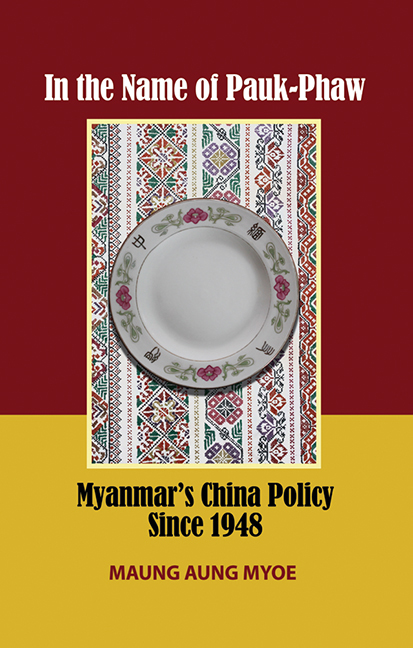Book contents
- Frontmatter
- Dedication
- Contents
- About the Cover
- Acknowledgements
- Chinese Names
- 1 Introduction
- 2 Sino-Myanmar Relations 1948–1962: The Years of Charting the Water
- 3 Sino-Myanmar Relations 1962–1988: Into the Years of Living Dangerously
- 4 Sino-Myanmar Relations 1988–2010: Towards Closer Cooperation
- 5 Conclusion
- Appendices
- Bibliography
- Index
- About the Author
3 - Sino-Myanmar Relations 1962–1988: Into the Years of Living Dangerously
Published online by Cambridge University Press: 21 October 2015
- Frontmatter
- Dedication
- Contents
- About the Cover
- Acknowledgements
- Chinese Names
- 1 Introduction
- 2 Sino-Myanmar Relations 1948–1962: The Years of Charting the Water
- 3 Sino-Myanmar Relations 1962–1988: Into the Years of Living Dangerously
- 4 Sino-Myanmar Relations 1988–2010: Towards Closer Cooperation
- 5 Conclusion
- Appendices
- Bibliography
- Index
- About the Author
Summary
On 2 March 1962, the Tatmadaw, under the leadership of the then Commander-in-Chief, General Ne Win, carried out a military coup in the name of the Revolutionary Council and took over control of the State. The Revolutionary Council immediately issued a statement that it would not deviate from Myanmar's declared policy of “positive neutrality” in its conduct of foreign relations. A year later, the new government called Myanmar ambassadors back for consultations. On 2 September 1963, they were briefed on the council's approach to international affairs. General Ne Win said: “What is well-defined and clear-cut in our international relations, is our policy of strict neutrality of non-alignment. It is extremely important for our ambassadors to adhere to this policy in the discharge of their duties… Especially at this juncture when international politics is overshadowed by the split between the East and the West, the split doesn't stop with these two power blocs but at times has repercussions on us. Only if we can live up to our policy of neutrality, can we hope to meet the situation”. Fearful of the spill-over effect of global Cold War in general and of the intensifying conflict in Indochina, in particular, the Myanmar government tried to avoid involvement in balance of power politics. Despite this undeniably realist worldview, the Revolutionary Council government had found isolation as the best course of foreign policy for the young nation.
Nearly two months after the military takeover, on 30 April, the Revolutionary Council proclaimed the “Burmese Way to Socialism”. The Burmese Way to Socialism (BWS), heavily influenced by Marxist and Buddhist philosophies, subsequently became the political and socio-economic foundation upon which the Revolutionary Council based its policies. On 4 July, the Revolutionary Council formed the Burma Socialist Programme Party (BSPP) as a political organization to lead the socialist revolution in Myanmar. On 23 March 1964, the Revolutionary Council government issued a decree entitled “The Law Protecting National Unity”. Under this law, all political parties except the BSPP were abolished and their assets appropriated. The Revolutionary Council now held a Marxist world view of class struggle between the forces of socialism and those of capitalism.
- Type
- Chapter
- Information
- In the Name of Pauk-PhawMyanmar's China Policy Since 1948, pp. 57 - 104Publisher: ISEAS–Yusof Ishak InstitutePrint publication year: 2011

